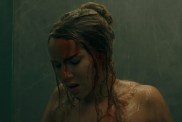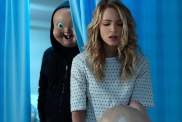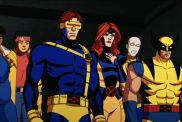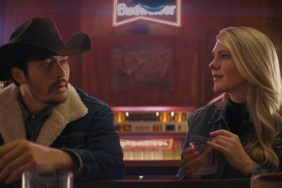300 composer on Halloween, Dead and Rejects

You can’t talk about the modern horror movie without discussing the remakes, and while there have been many dogs, one of the remakes that still stands up three years later is Zack Snyder’s Dawn of the Dead. Before you start up on the tired fast-vs-slow zombies debate, that’s not what we’re here to talk about. No, this is about the musician who composed the film’s score, Tyler Bates, who has been making waves in Hollywood after a number of breakout hit movies. Soon after doing the score for Dawn, Bates was working with Rob Zombie on his 2005 sequel The Devil’s Rejects and with Dawn writer James Gunn on his directorial debut Slither, placing Bates firmly among the pantheon of modern horror movie composers.
Bates’ biggest success though would come earlier this year when he reteamed with Snyder to compose the score for a movie based on Frank Miller’s graphic novel 300, a huge blockbuster hit that helped the soundtrack record set new sales records. (Also stirring up a bit of controversy, which we won’t get into here.)
Later this month, Bates will be back in the world of high-profile horror remakes, reteaming with Zombie on his long-awaited take on John Carpenter’s Halloween with Bates’ inimitable sounds mixing it up with Carpenter’s classic themes, and then Bates is back to work with Snyder on the equally ambitious movie based on Alan Moore’s Watchmen. (Somehow, he also has time for his own personal music project, Roseland with 300 vocalist Azam Ali as well.)
Bates managed to break away from finishing up Halloween to attend a panel at Comic-Con International and the premiere of the 300 HD-DVD, which took over the San Diego Padres’ home Petco Stadium for an evening. We had a chance to sit down and talk with him before the event about his process for creating music while working with Zack Snyder and Rob Zombie on their current and upcoming projects.
ShockTillYouDrop.com: Is this your first Comic-Con?
Tyler Bates: Mine? Yeah. I was going to come to the last one, but I was working on “300” and I almost couldn’t be here today because of “Halloween.” I’m in the middle of the dub right now, and Rob just gave me another picture less than two weeks ago with an extra fifteen minutes of footage and a whole new picture. We’re mixing the music even today and they’re dubbing the movie, so I’ll be writing another ten minutes before Monday I’m sure.
Shock: Were you able to get to their panel earlier?
Bates: No, I couldn’t because it was overlapping with “300” and they wanted me to go to that. I’ll see Rob tomorrow. He’ll come over and heckle me at my house I’m sure.
Shock: When tackling remakes like “Halloween” and “Dawn of the Dead”, both well known horror movies with equally familiar music, how do you go about approaching something like that?
Bates: Okay, hopefully I can answer this in a way that doesn’t sound disrespectful to the movies. Like “Dawn of the Dead,” I just felt that the way Zack made that film, I just didn’t feel that the original (music) was relevant to what Zack was making. Part of it is the social commentary that George Romero made in the original. I loved the music of Goblin in the original. It’s cool, but it was so specific to the time and “Dawn of the Dead,” the Zack Snyder version, had such a different attitude, and it had to become about something other than the consumerism and all that stuff that was going on in the original. I really let go of whatever the original was and said, “That was cool and this is a different thing.” Zack has a very interesting personality, and I thought the music should be an extension of his personality and the characters. Now, with “Halloween,” we’re definitely embracing some of the John Carpenter themes.
Shock: Of course, the original movie has that famous theme that everyone knows.
Bates: Well, the main title theme, we definitely destroyed that for the soundtrack album. I think it might be in the end credit crawl, but it’s too intense for the movie. Now how it actually came about was that Rob called me a year and a half ago and said, “Hey, I’m thinking about doing this. What do you think about it?” We talked about it and he said, “Would you mind working up a theme for me to go into the Weinsteins and lay out my presentation as far as what kind of movie I want to make?” Really what I did was it was to express not just that theme but also to express the aesthetic that Rob set out to do, so a lot of the contents of the music was embodying the character of what you might imagine the action, the violence, the drama, all of it to be, and the entire psychotic nature of the film and Rob’s aesthetic. That was great and they loved it, and it’s going on Rob’s soundtrack album for the songs. In the context of the film, it’s too intense, like it just usurps the drama and that’s first and foremost. Definitely with the classic John Carpenter themes, I pared most of them back near to where John Carpenter had originally done them. By all means, he kicks ass and he deserves ultimate respect from me. When Rob called me, I said, “This is a guilty pleasure just to be able to commit those notes of the theme to a movie.” When I first saw “Halloween,” it just blew my mind and the theme blew my mind, I just loved it. It’s been a lot of fun and then there’s one theme, we call it “The Stalking Theme”⦠that DUN⦠DU-DUN⦠so there are various permutations of that in the film, too. Basically I had done it and they temped it in there. The entire score we obviously were quoting from the John Carpenter stuff, but while Rob was shooting, I wrote a temp score for him and that’s like protocol for me these days to do that. I’m doing it on “Watchmen” as well.
Shock: You already started working on music for “Watchmen” even though they haven’t started shooting it yet?
Bates: I’m going to start flying up there one week per month starting November. They’re filming until February. So I’ll bring a studio with me. I’ll bring my music editor with me, so I’m going to write for the assembly and we’ll do mash-ups of music that’s not from other movies, but our own⦠hopefully I can do most of it from writing but obviously we have to generate a lot of material quickly to meet the needs of the editor. I just want to make sure in the future that for me, in my scores, the beats are not mandated by an editor locking into other stuff.

Shock: That’s interesting you say that because not a lot of composers get that luxury, to create music before a film is edited.
Bates: Well, you know what? You have to decide that you’re going to skip a job here and there and not make the money to do it. It’s important to me because I think the process is very strange, what’s going on nowadays, and I understand why the process is in place, but it’s a very weird premise to walk into a film where an editor has arbitrarily chosen music from other movies to temp into a movie, and they cut to those beats and cadences, and the composers get screwed, because there’s a lot of issues with that. Zack is wonderful and we discussed “300” and it was cool and it went well. I was involved with Zack from the very beginning before he even did his first animatic that was his presentation to the studio. Not even the live action, this was when they filmed the pages from the comic book. This was before Warner Bros. signed it and right after “Dawn of the Dead,” he called me and said “Hey, do you have time to come over and talk to Kurt and I about this project?” I said “Sure” and he showed me the book. Zack told me, “This the bible, this is the movie.” I didn’t know the book. Honestly, I’m kind of ignorant with the comics, and I thought the book was amazing when I looked at it. He told me what he was doing and he said, “We want to film these pages, make an animatic out of it and present it to the studio and we’re also going to show other things, like statuettes and drawings and costumes, if you can do music for it.” I said, “I think we need to figure out how to make the music adhere or coalesce with these pages in this book.”
Shock: The first time I watched “300,” I was blown away by the music, because that’s really the one thing you can’t get from reading the graphic novel.
Bates: Yeah, and once Warner Bros. shook hands with them, he did that test shot and I scored that, and that was just sort of a graduation or a continuum of what we had done with the other material, because I’d done like ten minutes of music. From that, we started talking about filming once Warner Bros. said, “Okay, we’ll do it as an R-rated film” because Zack said, “I’m not doing a PG-13” when they said they wanted to explore that. That’s a problem in Hollywood. The themes are R-rated on a lot of movies that are PG-13 and you can maybe not show someone being beheaded or disembowled or whatever, but the fact is that’s what’s going on and the violence plays in your imagination. At any rate, Zack was filming and he told me “We’re going to do this thing. There’s this big tent that Xerxes has and all this sex is going on. There are all these people that have been disfigured because they’d been punished,” so I did music for Xerxes’ tent and then I did these cadences for him to battle train the actors to. It was kind of cool, because there’s a long history to how the score developed.
Shock: And there’s a new CD out soon, too, right?
Bates: Yeah, this is the fifth edition, and it’s sold like 150,000 already, which is incredible. I’m just blown away. It’s a testament obviously to the success of the film and then fortunately, I’m very close with some amazing artists, especially Azam Ali, who is the vocalist in the music. Her and I are really good friends and we did a record together, which was her first English spoken collection of music, which we did simultaneously to working on “300.” This was music she was really involved in. I worked with her on it. I didn’t just have her come in the studio and say, “Give me some of that Film Score Oohs and Ahs 101” you usually hear. That’s bullsh*t.
Shock: What was your background before you started doing film scores?
Bates: I’ve always been in bands, always written music. From the age of four or five, my Mom was like a music junkie. She had an amazing stereo, and she used to buy 12 records a week, so I would just get hooked on all kinds of records, whether it’s Frank Zappa’s “Hot Rats” when I was 4 years old, “Jesus Christ Superstar,” “Hair,” the Beatles, Joni Mitchell, Burt Bacharach, Mingus, all this stuff I was listening to as a little kid. I was so intrigued by it. I’d read all the liner notes as soon as I was old enough to read or else she would read them to me. I was a little bit sidetracked when my cousins turned me onto Kiss (laughs). I dropped my saxophone for an electric guitar, no doubt, but I had a lot of great experiences in rock bands. I moved to L.A. to produce other artists and to be a songwriter and producer with people and I ended up working with some great artists and then I got a record deal and that was a thing, then I was doing these B-movies, C-movies, to pay my rent and in between those, I was painting houses. I was doing whatever I could to keep my phone on.
Shock: How did you meet up with Rob and Zack? Was it just the usual thing that you were doing work that they eventually heard?
Bates: I’d done a ton of movies and I did such a low budget movie that I’d call it a minus budget movie, because I lost money doing the score. I did this movie for Mario van Peebles called “Baadasssss!”
Shock: Really? I loved that movie!
Bates: I love it, too, and so the music supervisor G. Marq Roswell, he was on it, and he saw how I handled the process. He knew I made no money, I lost money on it and yet I hung in there and I did a lot of music for Mario. Mario was over the moon about it, and it was really a great project, other than the monetary repercussions, but (Marq) was like “I think you should do ‘Dawn of the Dead'” which he was on and they were in the preliminary stages. And I was like “How am I going to do that? I’ve never done a horror film.” He said, “Let me get you a script. Read it and maybe put some music together.” I’m a dark person by nature, but I’ve just never done like a bonafide horror movie, and he said, “I’ll get you a meeting with Zack Snyder. I think this guy’s something special.” Without being asked, I did write a couple pieces of music and then I put together a CD compilation of obscure pieces of music that I thought suited the nature of the script, ’cause I didn’t have any in my repertoire.

Shock: Did you know the original movie and the Goblin music at that point?
Bates: Yeah, but I just figured I’d ignore it, and so I went into this meeting. He’d met everybody who’d done big horror movies in Hollywood, and he asked me for my opinion on the music. He showed me the first eight minutes and said, “I think we should do something like this. The orchestra needs to sound like a black fog of death.” And I said, “It just needs to be visceral, kind of like Krzysztof Panderecki.” He says, “Whodewhat?” I said, “Kind of like Panderecki, Bartok, that kind of 20th Century dissonant orchestral work” and right as I said “Panderecki”, Eric Newman, Randy Newman’s son who was a producer on it, walked in the door with a Panderecki CD and he’s like, “I can’t believe you just said that. My Dad said that if he was directing this movie, he would put Panderecki’s music in it.” We put on a piece from the CD I compiled for Zack and he was like, “Wow, that’s dark sh*t.” Of course the studio didn’t want me. They wanted a big name guy and weeks went by and they kept asking Zack what he really wants to do, and he was like “I dunno. I really want to hire that Tyler guy.” That’s how it happened and fortunately, he believed in me, and “300” was a natural progression and now “Watchmen.” He’s a loyal person as long as you are committed to doing your own personal best. Doesn’t mean you can’t make mistakes but as long as you’re committed to being your own best, he’s a loyal person and I appreciate that. Rob Zombie’s the same way. That was a different story.
Shock: It’s gotta be a different relationship because Rob actually comes from a music background, and in theory, he could do his own score if he really wanted to.
Bates: In theory, yeah, and he did on his first movie. I assumed he was going to do that to some extent on “Devil’s Rejects.” I’d met Rob a number of times. We had the same lawyer, who we’re both friends with, and I’d met him a couple times at dinners over there and what not, and I heard that he really loved “Dawn of the Dead.” He went to the premiere, and a mutual friend said, “He flipped out over the movie and loved your music.” I called our lawyer and said, “Jeff, if you want to tell Rob that if he wants any help with the music on his new movie, I’d be happy to do it. It doesn’t mean I have to be the composer guy. It would be interesting.” Two months later, Rob called me up and he said, “Hey, what’s your schedule like? Are you interested in doing this?” He didn’t call anyone else, he just called me, and was like “Look, I put 80 scores against the picture. Nothing works. I need you to just figure out what this is and how to make it work and we need a LOT of music.” I said, “Okay, give me three weeks and I’ll have something for you.” He came over the first time and to be honest with you, I was kind of nervous. I was playing him a big scene in the motel room when they charge in and the one girls’ in the shower and she gets pulled out, and I knew it was a big scene for him, as far as what it means to the movie and the music was going to play a huge role. There was nothing discernible about any component of the music that you could point to, no instrument. I made all the sounds for it. I make all the ambient sounds for every movie. Instead of just synthesizers, I make a whole cache of synth sounds within the scope of the music for each movie, so it exists nowhere else in the world, just in that movie. It’s not for posterity. I just don’t want to give him what I give Zack Snyder and I don’t want to just hit the Soft Synth that goes “chikachikachika.” It’s just not how I do it, so anyway, I was kind of nervous ’cause I was like “What if he hates this?” I don’t even know what the f*ck the music is but it sounds cool to me and I sensed that Rob was going to like it, so I played this three and a half minute cue for him, I stopped it, turned around and said, “What do you think?” Now I don’t really know Rob. I’d met him but we hadn’t had conversations and he doesn’t open up very quickly to people. He’s like, “F*cking awesome.”

Shock: He’s also a musician who has a lot of knowledge about music and musical references, so it must be an interesting collaboration.
Bates: Yeah, there’s no doubt. Rob is very, very bright, so that was a great moment, and you know what? He knows I’m a person who’s really hard on myself, and so “Halloween,” we’ve had zero changes to music. “Rejects” there were zero changes to music. I’m not saying he doesn’t have an influence ’cause we talk and those conversations inform the music as I go anyway. He never makes a musical reference out to me ever. It’s always in dramatic terms and I love that. It’s entirely a director/composer type thing.
Shock: “Rejects” is an interesting case, too, because that movie was driven by all of its Southern Rock, so how did you work around that compared to something like “300” where it’s all music you’ve written?
Bates: Well, you have to play against that music, but again, the quality and character of the score has to embody some of the nastiness of the film, the subject matter, and of course, the classic feeling of the songs in there and still play against it enough so that it doesn’t seem like you don’t know what the songs and the score is. In that kind of movie, you really need to be able to feel the difference between the two in my opinion. To make “Freebird” pop and to make some of the other great songs pop, they needed to have their own space, and I didn’t need to assimilate that music. It was really to focus on the texture of the film and the characters and find out how to adhere the music to those people. It’s not like a joke of them, even though it’s walking the fence sometimes, like you have the clown scene when Captain Spaulding and steals that woman’s car and smacks her around. That movie kind of messed me up a little bit.
Shock: I can see that. I really like Rob as a person and a filmmaker but I’m a big “Three’s Company” fan and you just don’t do those kinds of things to Terry in my book.
Bates: He told me that she was the one who pushed that scene though. She wanted to do all that. I mean, personally it did leave me in a pretty dark place.
Shock: Are you able to work on the music for more than one movie at once or do you try to focus on one movie and finish it up before moving on?
Bates: They tend to overlap sometimes. I’m not the kind of person to knowingly do that. I don’t have people write my music for me. My background’s not formal in the way that a lot of Hollywood composers are, and I respect the work. I mean, James Newton Howard, he’s amazing. He does a lot of fantastic work, but really the ones who spoke to me and made me say, “I really want to do this” were like Henry Mancini, Bernard Hermann, even Max Steiner. I mean that stuff just made an impression on me, maybe because of the movies. I saw “Ben Hur” as a kid and I was like “Holy sh*t. How did they get all those people on the screen?” But the music was really fantastic to me. I love music but the most important thing to me is to be 100% available to myself and my directors at the same time, so knowingly booking things that overlap is bullsh*t. For instance, to go up and write “Watchmen” for a week every month while they’re filming, I do one less job, but I do it, because I know that in order to give Zack what he needs, I have to have the energy and to take the time to think about it and see where he’s going with it.
Shock: Did you already sit down and read the “Watchmen” graphic novel and what are your instincts on that? As I mentioned, it’s hard for me to think musically even though I read them and I have a music background.
Bates: Well, I’m not a comic guy, but of course I read it when I knew he was making it, but not until “300” was done and not until he asked me to do it. I thought it was really great. I love the characters and I love Rorschach, and they just sent me the script a couple weeks ago and I read it and thought, “Wow, this is a fantastic adaptation of this book.” I didn’t know how they could possibly condense that book, but you know what, people thought that about “300” as well. There were people trying to make “300” and there were several versions floating around town and they couldn’t make it.
You can check out Tyler Bates’ work in Rob Zombie’s Halloween, when it opens on August 31, and there’s a special Collector’s Edition of the 300 soundtrack including a 42-page book available from Amazon.com. You can also check out Tyler’s ambient pop project Roseland with Azam Ali on MySpace.
Disclaimer: This interview has been slightly modified from what was originally posted because a few remarks made by the subject might have been misunderstood or intentions may have been misconstrued in the way they were worded or formatted.
Source: Edward Douglas









